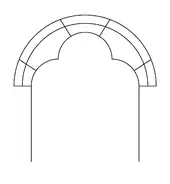
The trefoil arch
A trefoil arch, or three-foiled cusped arch (occasionally trilobite arch, no connection to an actual trilobite), is an arch incorporating the shape or outline of a trefoil – three overlapping circles.[1] It has been widely used for its symbolic significance in Christian architecture. Trefoil arches are common in Gothic architecture for portals and decoration.[1] Trefoil or "trilobed" arches are also a characteristic feature of decorated portals in late Fatimid architecture and Mamluk architecture in Egypt, from approximately the 12th to 16th centuries.[2]: 191 [3]: 89
 Trefoil arch in the choir of the parish Church of Saint-Eliphe (13th century), Rampillon, Seine-et-Marne (Ile-de-France)
Trefoil arch in the choir of the parish Church of Saint-Eliphe (13th century), Rampillon, Seine-et-Marne (Ile-de-France)
See also
References
- 1 2 Hourihane, Colum (2012). The Grove Encyclopedia of Medieval Art and Architecture. Vol. 2. Oxford University Press. ISBN 978-0-19-539536-5.
- ↑ Graves, Margaret S. (2018-07-31). Arts of Allusion: Object, Ornament, and Architecture in Medieval Islam. Oxford University Press. ISBN 978-0-19-069592-7.
- ↑ Behrens-Abouseif, Doris (2007). Cairo of the Mamluks: A History of Architecture and its Culture. The American University in Cairo Press. ISBN 9789774160776.
This article is issued from Wikipedia. The text is licensed under Creative Commons - Attribution - Sharealike. Additional terms may apply for the media files.